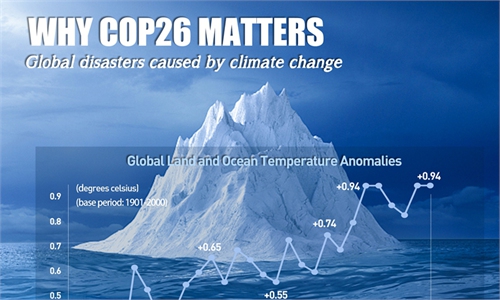
China, US Illustration: Chen Xia/GT
Editor's Note:
The 26th UN Climate Change Conference, known as the COP26, started on Sunday in Glasgow, UK. This meeting has been widely portrayed as the most important global climate talks since the 2015 Paris climate accord. Ahead of the summit, there were many discussions on how China-US tensions will impact the negotiations at the COP26 as well as the global fight against climate change. Can climate change become a breakthrough to improve China-US relations? How to promote cooperation between the two countries on climate change? Sourabh Gupta (Gupta), a senior fellow at the Washington-based Institute for China-America Studies, shared his insight over these issues with Global Times (GT) reporters Yu Jincui and Lu Yuanzhi.
GT: What do you expect for the COP26? What goals do you think should be achieved?
Gupta: I expect a modest but positive outcome at the COP26, with a broad consensus arrived at with regard to 2050/60 net zero targets, the formalization of moves toward the elimination of coal from the energy mix, and an increasing ambition on near-term nationally determined contributions to reduce greenhouse gases. The conference will certainly not be a failure. All the major emitters, with the exception perhaps of a few, such as India, are pulling in the same direction. Of course, the resounding success that one had hoped for a couple of months ago, going into the COP26, will not be achieved. And the global community will still remain quite some distance away from the pathway to limiting global warming to 1.5 C above pre-industrial levels.
GT: China's aims to have carbon dioxide emissions peak before 2030 and achieve carbon neutrality by 2060 have been described as "an arduous task." But many Western countries and media outlets are attempting to pressure China to achieve more "ambitious" emission goals. What's your take in this regard? Do you think China's aims are consistent with the pace of its development?
Gupta: China's carbon dioxide emissions-related aims are not just consistent with its pace of development; they exceed its pace of development. China deserves commendation, not criticism, for the difficult pledges that it has taken on and their concerted translation into action. The stock of global cumulative emissions from the Industrial Revolution onward emitted by the US and Europe is almost four times that of China's. It is high time that these advanced countries learn to take greater responsibility for this negative externality unleashed on the planet and in particular, aim to achieve carbon neutrality at an early date not just on the production side of their economies but also the consumption side of their economies. At minimum, the common global effort to arrest the pace of climate change must not be allowed to become a "second colonialism" inflicted on the developing world, with the burden of adjustment borne primarily on the back of the developing world's development-related aspirations.

Sourabh Gupta. Photo: Courtesy of Gupta
GT: In an interview with Xinhua News Agency, you said China's aims to have carbon dioxide emissions peak before 2030 and achieve carbon neutrality before 2060 have "helped inject energy and vitality back to global climate change talks, with other countries - mostly in East Asia - also following in China's wake and laying out ambitious climate change targets." How do you evaluate China's efforts for global climate change? What have other countries demonstrated?
Gupta: President Xi's pledge at the UN General Assembly session in September 2020 on a peaking date (2030) and a carbon neutrality date (2060) was hugely instrumental in breathing life back into major country climate change politics and pledges - just as the US-China Joint Announcement on Climate Change and Clean Energy Cooperation of November 2014 had set the wheels in motion on the important Paris Conference outcomes. Japan's Yoshihide Suga and South Korea's Moon Jae-in followed soon thereafter with ambitious pledges too.
It is important to note that China has continued in its reformist, climate-conscious vein in 2021, pledging to peak coal emissions during the 2026-30 period, inaugurating its nationwide emissions trading scheme, and recently releasing its detailed Action Plan for Carbon Dioxide Peaking Before 2030 across a range of industries and sectors. More to the point, China has laid out an all-of-government-and-society-wide emphasis on combating climate change as well as framed the challenge through the lens of commercial opportunity in areas ranging from new-energy vehicles to smart cities. China should continue on this positive track, treating its neutrality and peaking date targets, especially its "peak coal" date, as a floor rather than a ceiling and attempt to pull them forward as best possible. And just as importantly, if other major global emitters can also summon the same level of ambition as China has displayed, the planet could be in a much better place in terms of hitting its 1.5 C global warming target.
GT: How do you see the US' prospect to achieve carbon neutrality before 2050? Republicans have often resisted cutting emissions. Former US president Donald Trump withdrew the US from the Paris Agreement. If Trump or the Republicans get elected again, how will it affect the US' commitment in reducing emissions and the joint efforts by other countries to tackle climate change?
Gupta: I would not count out the US' prospect of achieving climate neutrality before 2050, despite the habitual nay-saying of the present-day Republican Party. The Biden administration unveiled an ambitious set of near-term targets to decarbonize its transport and electricity grids in April this year. At the state and local levels, where the effects of global warming are most felt, governors and mayors have shown an admirable commitment to fighting climate change. The state of California in particular has been a trailblazer, literally stripping out carbon-intensive fuels as a feedstock for electricity generation. Countries and states/provinces around the world would do well to study the California example.
You are correct on the point though that if half the political spectrum in this country (the US) is unwilling to admit - let alone shoulder - our collective responsibility to address climate change, we will all be poorer off. It is doubly unfortunate that a small sliver of Democrats too are unwilling to do the needful on climate change, as a result of which President Biden has had to strip out a significant amount of congressional funding to "green" the US electricity sectors. And this therefore begs the question: Shouldn't there be enforceable penalties on countries that fail to hit their nationally determined greenhouse gas reduction targets? During the Trump-era bilateral trade and investment negotiations in early-2019, the US side had insisted that China commit to memorializing its liberalization commitments in national legislation, rather than merely in the State Council directives and regulations. Perhaps, it is time for the shoe to be on the other foot and have Washington memorialize its COP26 greenhouse gas reduction commitments in Congressional legislation too.
GT: Some analysts say that geopolitical tensions between China and the US will affect the cooperation in climate change. It has been reported that the Biden administration is divided over its China policy. US special envoy for climate John Kerry told Biden that he wouldn't achieve his goal of tackling climate change, a key administration priority, unless the US-China relationship improved. But national security advisor Jake Sullivan said, "We are not in the business of trading cooperation with China on climate change as a favor that Beijing is doing for the United States." Can climate change become a breakthrough to improve China-US relations? How to promote cooperation between the two countries on climate change?
Gupta: It is an unfortunate fact of life that geopolitical tensions between China and the US have seeped into climate change collaboration. There is a sub-optimal, path dependency that has crept into their respective relationship-related equations. Washington seeks selective cooperation with Beijing on an a la carte basis (including on climate change) that is framed within a broader structural context ranging from coexistence to outright adversarial relations with China. For its part, Beijing prefers a more structured relationship, where bilateral cooperation (including on climate change) is preceded by the restoration of guardrails to the overall China-US strategic relationship. Between these two approaches, it is unfortunately cooperation on climate change that has seemingly fallen through the cracks. At this time, the best that can be hoped is that both countries individually reflect on the gravity of the climate challenge ahead and find avenues for concerted cooperation - at the sub-national level initially, and hopefully as relations stabilize, at the presidential level.
GT: In terms of climate change, you said in April that, "both the United States and China can rise above their differences and cooperate together in the better interests of all." Are you still optimistic about the prospect of the cooperation between China and the US on climate change?
Gupta: Well, I am not as optimistic about the prospect of cooperation at this time. The momentum going into Paris 2015 was furnished by the historic US-China Joint Announcement on Climate Change and Clean Energy Cooperation in November 2014, followed by the US-China Joint Presidential Statement on Climate Change in September 2015. By contrast, going into Glasgow 2021, bilateral relations are simply not where they were going into Paris, or for-the-matter should be. That said, their differences should not hold China or the US back from pulling in the same direction individually on this potentially existential challenge to our global community.
Separately, China should also aim to coordinate its climate change actions, going forward, with the European Union rather than wait interminably for a change of heart at the US' end. This is already the case in the trade and investment arena where China and the European Union have completed the Comprehensive Agreement on Investment negotiations. With its national emissions trading scheme already off-the-ground, Beijing should now gradually seek out complementarities with Europe's own emissions trading scheme across carbon-intensive sectors and industries, such that these two major economic areas can blaze a common pathway forward on trans-continental emissions trading, carbon pricing and greenhouse gas reduction.

